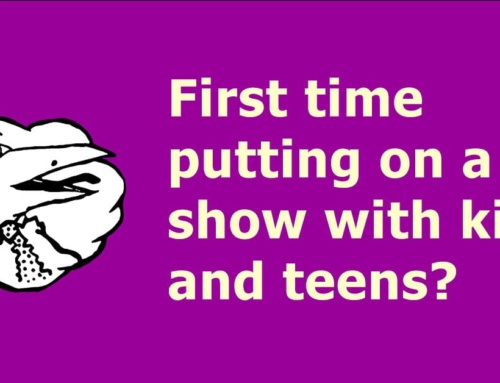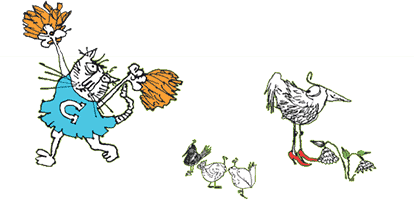
Let me start off by saying that I do not actually believe that there is such a thing as a ‘shy’ child. There are students who are cautious about joining in or performing right away. These are often the kids who are outgoing and creative at home, but who take a lot of time to warm up to others in groups. I also believe that it is harmful to label a student as ‘shy,’ as it can turn out to be a generalization stuck on a person for a lifetime.
I recently volunteered to teach an after-school drama class for a local theatre company so that I could try out some new games I invented and keep my skills fresh. I immediately noticed that one little girl in particular, I’ll call her ‘Maggie,’ was very reserved. We started with a repeating name game and she had trouble remembering and could barely whisper the other student’s names, even after being thoughtfully coaxed by the other students.
Bag of Tricks
Fortunately, I have a bag of tricks that usually work in these situations. First, I treat the student as if he/she can do it. I never talk down to them or pressure them when they decline to participate. I’ll say something like, “It’s okay to just watch this one. Let me know if you decide to play.” Then, I move on and play the game as if nothing happened. Some students just want to observe; I think it stems from a worry that they won’t get it right. That happens to all of us sometimes!
I do have one game in particular that, if played early on, can make a lot of headway with reluctant participants. Here is the description, but there is also a video of the game being played on Drama Notebook.
Two Sticks
(Materials needed are two sticks of equal length such as two wooden dowels or two drumsticks.) Players start in a circle. The leader starts by saying, “What are these?” The group replies, “two sticks.” The leader says, “No, they are my alien antennas!” The leader sticks them on her head, and then passes the sticks to the next player who turns them into chopsticks, and the next who turns them into stilts, and so on. Rules: no duplication; players may say “pass,” if they don’t want to play, or “come back to me” if they are stuck for the moment, but think they will come up with something.
Sometimes, students who are scared will actually say ‘pass.’ When this happens, I actually continue to play this game, going around the circle a few times UNTIL the reluctant student joins in…and they always do! None of the kids know that I am secretly waiting for that one student to play. My goal is to give him/her a feeling of satisfaction that they ‘did it.’ When played early on in a series of classes, this can have a lasting positive effect on that student’s willingness to participate.
Okay, back to Maggie. She was really a tough case. In addition to being occasionally afraid to participate, she was quite sensitive and would get upset if she wasn’t chosen to be ‘it.’ (Which I found interesting, given her trepidation over performing in general.) During one class, she burst into tears and said that she never wanted to come back! I continued to be compassionate yet encouraging with her, but I wondered if I was really reaching this child.
Near the last class, her father pulled me aside. He thanked me profusely for the work I had done with his daughter. He told me that he had seen a remarkable change in her confidence level since she’d been taking my class. He said that she always came home beaming on drama day, recounting everything we did and everything she tried.
Needless to say, I was shocked!
Then he told me a little more about her. Apparently, she had been adopted, and that her early life was less than ideal. She had some learning disabilities that she was struggling to overcome, which made her embarrassed because she really wanted to be good at things. He also told me that she had a beautiful singing voice and that she sang all of the time at home; she learns old Billy Holliday songs and performs them for her family.
So, inside of that fragile, frightened little girl, is a songbird that cannot be contained. And this one after-school drama class was getting her a little closer to being able to share her gift with the world.
On the last day, Maggie told me that she wanted to do her monologue but when it came time for her turn, she got scared. I asked if it would help if her mom went up with her (much to her mother’s horror!). Maggie nodded and reluctantly got up in front of the audience with her mom.
Then, I had a moment of inspiration and invited all of the other students to join her as well. We all stood behind Maggie as she quietly recited her monologue in front of the other parents and there was not a dry eye in the room, including mine.
It didn’t matter that her monologue was quiet. It mattered that she did it. Drama doesn’t have to be about ‘showing off’ at the end. Rather, it is a process that can have a powerful, transformational effect on a person.
Know that if you are teaching from a place of love and compassion you are making a difference.
And never, ever, call a person ‘shy.’








